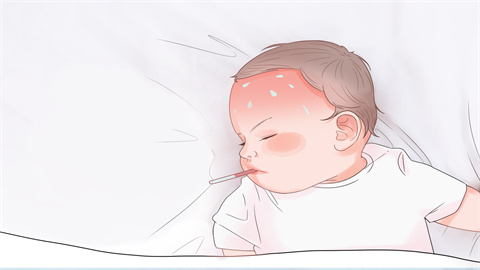What to do if a six-month-old baby has a fever
Generally speaking, fever refers to an elevated body temperature. A six-month-old baby may develop a fever due to factors such as excessively high environmental temperature, excessive physical activity or crying, upper respiratory tract infection, roseola infantum, or urinary tract infection. Treatment options, such as general care or medication, can be considered under a doctor's guidance. If symptoms persist, timely medical attention is recommended. Detailed explanations are as follows:

1. Excessively High Environmental Temperature
A baby's thermoregulatory center is not yet fully developed and is highly sensitive to changes in environmental temperature. When the environmental temperature is too high, the baby may be unable to effectively dissipate heat and maintain a normal body temperature, leading to an elevated temperature. It is important to maintain a suitable ambient temperature for the baby, avoid excessive bundling or overdressing, and ensure adequate ventilation.
2. Excessive Physical Activity or Crying
When a baby engages in intense activity or cries for a prolonged period, a significant amount of body heat may be generated. If this heat cannot be dissipated in a timely manner, it may lead to an elevated body temperature. It is recommended to appropriately schedule the baby's activity periods, avoid prolonged intense activity, and promptly comfort the baby during episodes of crying to minimize emotional fluctuations.
3. Upper Respiratory Tract Infection
An upper respiratory tract infection is typically caused by viral or bacterial infections. These infections can trigger an inflammatory response in the baby's body, leading to increased body temperature. Symptoms may include nasal congestion, runny nose, and cough. Medications such as pediatric paracetamol chlorpheniramine maleate granules, cefixime granules, or ibuprofen suspension may be used under a doctor's guidance for treatment.
4. Roseola Infantum
Roseola infantum is primarily caused by human herpesvirus 6 infection and commonly occurs in babies between six months and two years of age. The virus replicates within the body and releases toxins that stimulate the thermoregulatory center, causing an elevated body temperature. Symptoms may include rash, sore throat, and cough. It is recommended that patients use medications such as paracetamol suspension drops, pediatric Chuhiao Qingre granules, or Pudilan Xiaoyan oral liquid under medical supervision to alleviate symptoms.
5. Urinary Tract Infection
A urinary tract infection is generally caused by bacterial invasion of the urinary tract. Bacteria multiply within the urinary tract and release toxins, triggering an inflammatory response and causing an elevated body temperature. Symptoms may include frequent urination, urgency, and painful urination. Treatment options may include medications such as cefuroxime axetil granules, nitrofurantoin enteric-coated tablets, or sodium bicarbonate tablets, used in accordance with medical advice.
In daily life, it is recommended to maintain a balanced diet, provide the baby with adequate nutrition, enhance immunity, and reduce the risk of infections.










